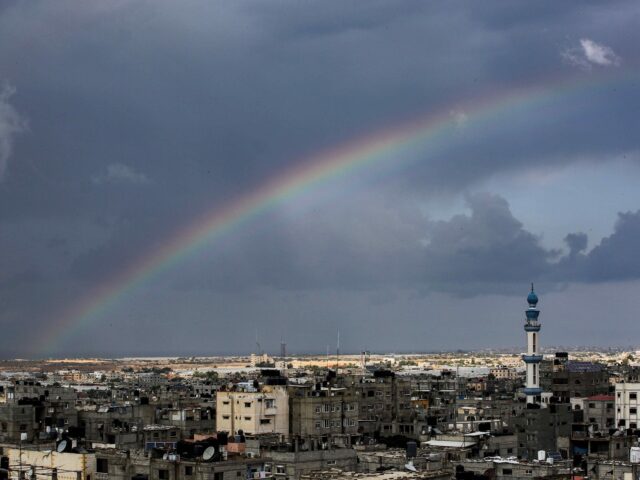There should be no ceasefire in Gaza until Hamas is eliminated. Any “pause” would slow the momentum of the Israeli military, allow Hamas to regroup, and give bad actors — like Russia and China — leverage to stop Israel from winning an existential war.
In the past, Israel has sought or accepted ceasefires with Hamas because of international pressure; because it believed that Hamas had been deterred by airstrikes; and because the cost of sending Israeli ground troops into Gaza was too great to bear.
But this time really is different.
The October 7 terror attack revealed that Hamas is not interested in governing Gaza but in murdering as many Israelis as possible. The sheer scale of the attack, and the brutality of the murders, was unprecedented.
Hamas showed that there is no way that Israel can coexist with it as a neighbor. It will not sit quietly, as the Syrian regime has done for 50 years, technically in a state of war with Israel but not actively engaged in attacks against it or attempts to invade.
Moreover, the fact that Hamas carried out its atrocities in the name of Islam means that the world has a stake in an Israeli victory. If Hamas survives, it will reignite radical Islamic terror throughout the rest of the world — in the Arab world, and in the West.
The cost in human lives, both military and civilian, will be much greater if Hamas is allowed to persist in its control of Gaza. Since it seized Gaza in a 2007 coup, it has sparked three major conflicts, causing civilian deaths among both Israelis and Palestinians.
Hamas causes untold hardship to the Palestinians themselves. It used child slave labor to build its underground tunnels, causing the death of scores of innocent children. And in all those tunnels, Hamas did not build one bomb shelter for Palestinian civilians.
The only “humanitarian” option is to remove Hamas from power, and to do so as soon as possible. Anything that delays that goal causes more unnecessary suffering, and risks the possibility that Hamas might not be removed from the Gaza Strip after all.
The mainstream media, and the so-called “international community,” are performing the usual routine of demanding a stop to the fighting because of the Palestinian death toll. They agree with Hamas that Palestinian civilians are not their responsibility.
They cite reports of deaths in Palestinian “refugee camps” — knowing full well that Palestinian casualty figures are unreliable, and fail to distinguish between terrorists and civilians; knowing full well that Hamas deliberately puts Palestinian civilians in danger.
These critics — who are well-represented among the correspondents in the White House briefing room — show no concern at all for Palestinian lives until Palestinian terrorists kill Israeli civilians. Nor do they show concern for Muslims elsewhere in the world.
They accuse Israel of “war crimes” for taking actions that are 100% legal under international humanitarian law. They quote legal principles like “proportionality” as if that word means the number of dead on one side must equal the number of dead on another.
“Proportionality” measures the risk to civilians against legitimate military goals. A bigger goal — removing Hamas from power, rather than just deterring it — has a higher acceptable risk. Even so, Israel has taken extraordinary steps to avoid civilian deaths.
President Joe Biden said the right things at first. He told the world that Israel had a “duty” to go after Hamas. But then radical Arab- and Muslim-American leaders, who refused to condemn Hamas, threatened not to support him in Michigan in 2024.
No one should want that kind of support, any more than one would want the support of neo-Nazis. But Biden wants it both ways. He wants a “pause” — though Israel’s advance in northern Gaza has no impact on humanitarian aid deliveries in southern Gaza.
The White House also claims that a “pause” would allow for the safe release of hostages. Hamas had weeks to release the hostages before the Israeli military went into Gaza on the ground. It was actually Israeli troops, not diplomats, who freed the latest hostage.
A “pause” would be little different from a “ceasefire,” and perhaps worse, because it would cause Israel to be blamed for starting up again. Ironically, the word “pause” translates into Hebrew as “ceasefire,” which is how Israelis understand it: as a surrender.
Israel is on the verge of removing a regional threat. It has the main Hamas hub in Gaza City surrounded. It has expert combat engineers working on the tunnels. Most of all, it has a highly motivated force, regulars and reservists, who are determined to win.
I was at the front last week. I spoke to those soldiers. They know they face death in Gaza. They are willing to take that risk. They feel they have no option. Between waiting to be murdered in their homes, and facing death on the battlefield, the choice is clear.
And they are determined to win. No Israeli government that accepted a ceasefire would survive.
The only ceasefire the world should pursue is the final one — the one that takes effect when Hamas is defeated. However long it takes, that day must come.
Joel B. Pollak is Senior Editor-at-Large at Breitbart News and the host of Breitbart News Sunday on Sirius XM Patriot on Sunday evenings from 7 p.m. to 10 p.m. ET (4 p.m. to 7 p.m. PT). He is the author of the new biography, Rhoda: ‘Comrade Kadalie, You Are Out of Order’. He is also the author of the recent e-book, Neither Free nor Fair: The 2020 U.S. Presidential Election. He is a winner of the 2018 Robert Novak Journalism Alumni Fellowship. Follow him on Twitter at @joelpollak.

COMMENTS
Please let us know if you're having issues with commenting.